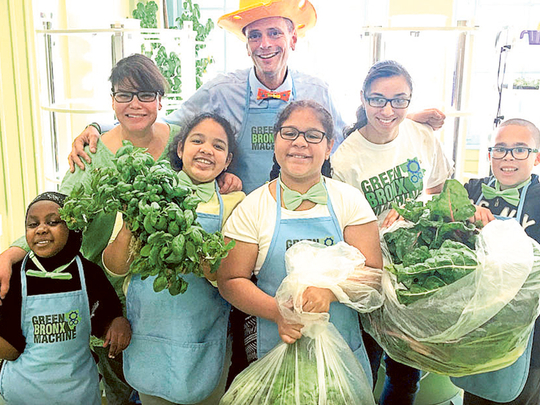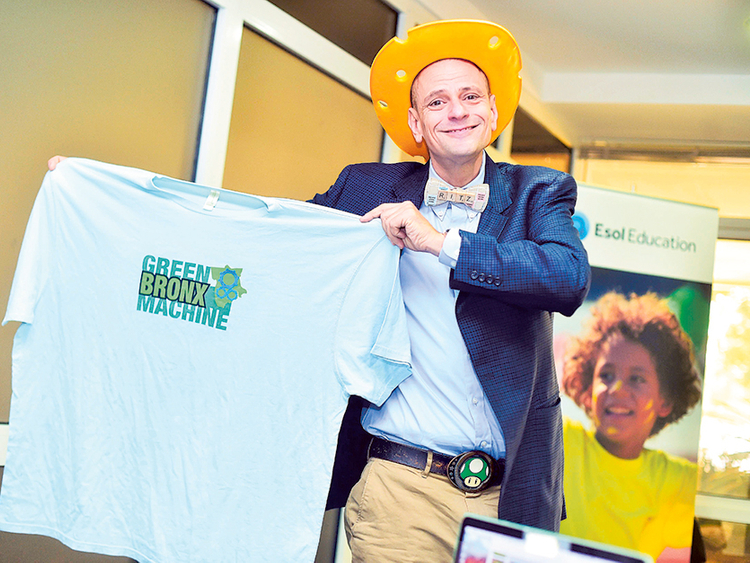
Dubai: A revolutionary American school programme that is teaching New York City children in South Bronx to not just survive but thrive in the poorest Congressional district in the United States has a lot of valuable life lessons for Dubai and UAE students, contends its creator and celebrated teacher Stephen Ritz.
Invited to Dubai to speak on Wednesday to Universal American School students, the architect of the globally lauded Green Bronx Machine told Gulf News that encouraging students to grow, cook and eat their own foods in the classroom is tilting young minds towards a brighter, greener future for everyone on all sides of innovative inner-city urban gardens.
“We grow vegetables which grow schools and communities,” Ritz said in an interview, noting that roughly 45,000 pounds of home-grown food have been produced by South Bronx students who are learning hands-on sustainability skills of planting, caretaking and harvesting the benefits of hard work.
More than 750 students are adopting smart environmental stewardship by also growing their food in urban locations “using 90 per cent less water and 90 per cent less space”, he said.
Green Bronx Machine grows 37 fruits, herbs and vegetables in collective space encompassing more than 100 gardens set across six urban acres of rooftops, vacant commercial space, homes and classrooms.
The concrete jungle of South Bronx’s low-income residential towers interspersed with tired commercial buildings from better times are now sprouting green rooftops, Ritz said.
The success of the programme, Ritz said, has also helped lift hundreds of disadvantaged youth from the emotional and physical trappings in his native eight-block neighbourhood of broken, low-income families and lingering gang pressures.
“The Bronx is no longer burning, it’s booming,” said Ritz, who has captured global media attention through transformative results of his organic, bottom-up urban farming programme for kids in one of the toughest neighbourhoods in the Big Apple zip code.
“Children who have one caring adult in their life succeed. And when you teach kids about nature, you teach them how to nurture,” said Ritz, fresh from an invitation to the White House where he planted a new garden on the South Lawn as part of his global mission to grow children into healthy young adults.
A teacher at South Bronx Public School, Ritz said students working in his sustainable food programme have gone from a dismal 40 per cent daily attendance rate to 93 per cent and are enjoying a 100 per cent pass rate in state school exams.
The school has also recorded a 50 per cent drop in behavioural incidents under Ritz’s green lessons of sustainability for the future.
Ritz said he believes his unique learning approach can be beneficial to UAE students as sustainability elements of his South Bronx curriculum are introduced into core curriculum here.
“We’re very much in the infancy stages but are looking at a long-term crop,” Ritz said. “We are planning on an abundant harvest.”
In the end, being a good educator is all about reaching troubled students when their emotions and intellect are still malleable towards positive reinforcement.
“I believe it’s easier to raise healthy children than to fix broken men,” said Ritz.
Esol welcomes Ritz’s green approach
Esol Education believes green educator and innovator Stephen Ritz is the perfect partner to help its students at its two schools in the UAE learn the lifelong merits of sustainability.
In a statement, Esol educators said Ritz has a great deal to offer its students at Universal American School in Dubai as well as American International School in Abu Dhabi.
This week’s visit by Ritz to Dubai, said Esol, is helping to “jump-start sustainability projects within existing and future schools. The collaboration will also explore developing a fully sustainable future school concept for Dubai, in line with the UAE Vision 2021, a national initiative that aims to promote sustainable economic and social development by implementing green growth plans”.
Tammam Abushakra, an Esol Education adviser, said, “We aim to develop environmental and social responsibility within students right from the early years, which they will carry forward in their future careers.”













